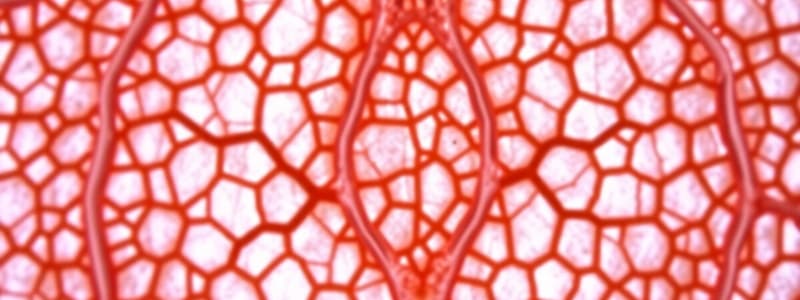Podcast
Questions and Answers
Which of the following locations is areolar tissue typically found?
Which of the following locations is areolar tissue typically found?
- On the surface of skin
- Surrounding muscle fibres (correct)
- In tendons
- Inside bones
What is a primary function of white adipose tissue?
What is a primary function of white adipose tissue?
- Storing energy (correct)
- Regulating body temperature
- Supporting nerve function
- Generating heat for newborns
Which type of connective tissue contains fine reticular fibers?
Which type of connective tissue contains fine reticular fibers?
- Areolar tissue
- Reticular tissue (correct)
- Adipose tissue
- Dense regular connective tissue
Which statement about brown adipose tissue is correct?
Which statement about brown adipose tissue is correct?
Where is reticular connective tissue predominantly found?
Where is reticular connective tissue predominantly found?
Which characteristic is primarily associated with dense irregular connective tissue?
Which characteristic is primarily associated with dense irregular connective tissue?
What is a common component of dense regular connective tissue?
What is a common component of dense regular connective tissue?
In contrast to dense regular connective tissue, which aspect is true for dense irregular connective tissue?
In contrast to dense regular connective tissue, which aspect is true for dense irregular connective tissue?
Which type of cell is predominantly present in both dense regular and dense irregular connective tissues?
Which type of cell is predominantly present in both dense regular and dense irregular connective tissues?
What feature distinguishes dense regular connective tissue from dense irregular connective tissue?
What feature distinguishes dense regular connective tissue from dense irregular connective tissue?
Which cell type is identified as a fixed cell and primarily involved in storing lipids?
Which cell type is identified as a fixed cell and primarily involved in storing lipids?
What is the primary function of plasma cells in connective tissue?
What is the primary function of plasma cells in connective tissue?
Which of the following cells is classified as a transient cell?
Which of the following cells is classified as a transient cell?
Mast cells are particularly associated with which of the following responses?
Mast cells are particularly associated with which of the following responses?
Which cell type develops from monocytes and assists the immune system by ingesting pathogens?
Which cell type develops from monocytes and assists the immune system by ingesting pathogens?
Which of the following accurately describes fibroblasts in connective tissue?
Which of the following accurately describes fibroblasts in connective tissue?
What is a significant role of mast cells in connective tissue?
What is a significant role of mast cells in connective tissue?
Which cell type is primarily active in wound healing by forming granulation tissue?
Which cell type is primarily active in wound healing by forming granulation tissue?
Flashcards are hidden until you start studying
Study Notes
Loose Connective Tissue
- Divided into three types: Areolar, Adipose, and Reticular.
Areolar Tissue
- Located beneath the epidermis, covers muscle fibers, surrounds nerves and blood vessels, and is found in and around mucous membranes.
Adipose Tissue
- Composed of a matrix of areolar tissue with two types:
- White Adipose Tissue
- Accounts for 20-25% of body weight.
- Functions include support, thermal insulation, and energy storage.
- Brown Adipose Tissue
- Generates heat, which is crucial for newborns.
- White Adipose Tissue
Reticular Tissue
- Characterized by fine branching reticular fibers in a semi-solid matrix.
- Contains reticular cells, monocytes, and lymphocytes.
- Primarily found in lymph nodes and lymphatic organs.
Dense Connective Tissue
- Dense Irregular Connective Tissue
- Composed of collagen fibers, fibroblasts, capillaries, and elastin.
- Dense Regular Connective Tissue
- Composed of collagen fibers, capillaries, and fibroblasts.
Cells of Connective Tissue
-
Plasma Cells
- Transient cells that develop from B-lymphocytes, primarily located in lymph nodes.
- Produce and release specific antibodies, contributing to immunity.
-
Adipocytes
- Fixed cells known as fat cells, derived from fibroblast-like cells.
- Found in various connective tissues, mainly in adipose tissue, for lipid storage.
-
Macrophages
- Fixed, large irregular immune cells, also called histiocytes.
- Develop from monocytes, participate in phagocytosis of pathogens and foreign bodies, aiding the immune system.
-
Mast Cells
- Fixed cells derived from myeloid stem cells, located in loose connective tissue such as the liver and spleen.
- Contain histamine and heparin; histamine is involved in allergic reactions and vasodilation, while heparin prevents blood coagulation.
-
Fibroblasts
- Fixed, large cells with irregular shapes, derived from primitive mesenchyme.
- Present in every body tissue, responsible for secreting extracellular matrix components (collagen, elastin, fibronectin).
- Play key roles in wound healing and granulation tissue formation after tissue damage.
Studying That Suits You
Use AI to generate personalized quizzes and flashcards to suit your learning preferences.




